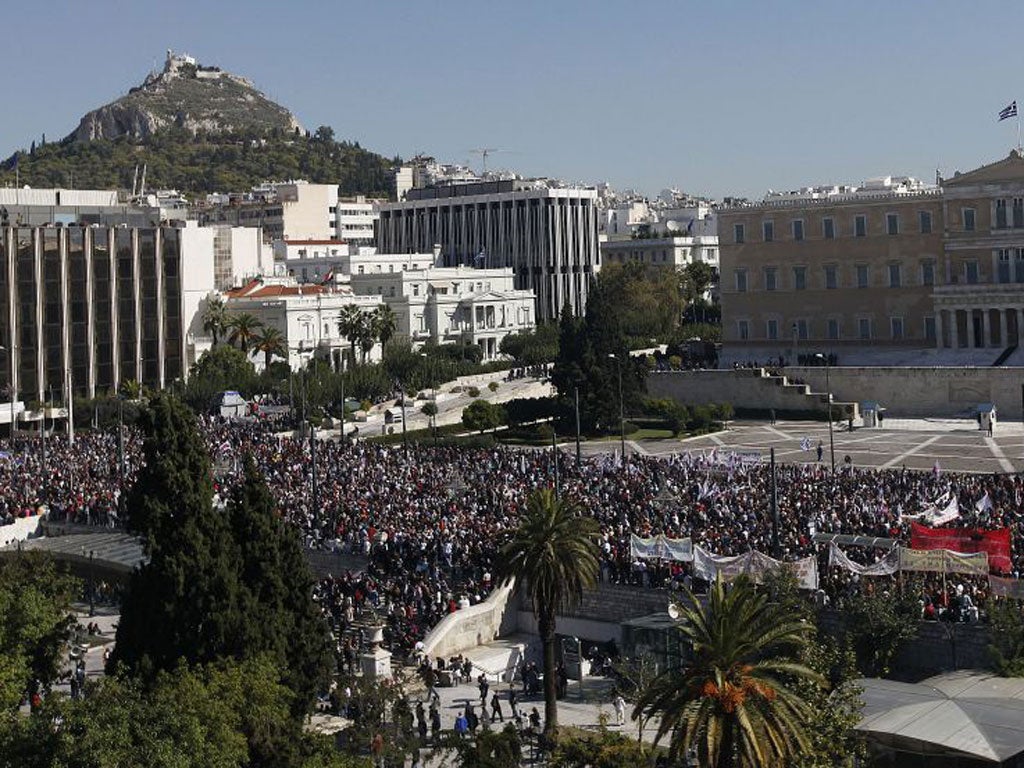Protester killed in Greece as austerity vote looms

A protester died during an anti-austerity demonstration that turned violent in the Greek capital, authorities said, hours before lawmakers were to vote on deeply unpopular new cutbacks demanded by creditors to keep Greece afloat.
Violent rioters attacked peaceful demonstrators with firebombs and stones as tens of thousands turned out in Athens. As the second day of a general strike paralyzed the country, more than 50,000 peaceful demonstrators flooded downtown Syntagma Square outside parliament, the scene of violent protests on Wednesday.
Creditors have demanded that Greece pass the extra austerity measures before they give the country more funds from a €110 billion bailout loan from other eurozone countries and the International Monetary Fund. Greece says it will run out of money in mid-November without the next €8 billion installment.
Greek lawmakers were voting on details of the proposals, which include putting 30,000 public servants on reduced pay and suspending collective labor contracts.
Parliament deputy speaker Anastasios Kourakis announced the death during a debate on the new bill ahead of the final vote later in the evening.
A Communist-backed union participating in the demonstration and guarding the rally identified the casualty as a 53-year-old construction worker and member of the union. It said it did not have the exact details of his death.
Initial reports indicated the man felt unwell during the protest and was taken to hospital, where he died of a suspected heart attack. An official announcement from the hospital was expected later in the afternoon.
Communist party supporters taking part in the Thursday's rally set up a cordon in front of parliament to prevent hard-liners from starting fights with police. But they came under repeated attacks by hundreds of masked protesters in motorcycle helmets who threw gasoline bombs and chunks of marble into the crowd.
Fights broke out as the Communist party supporters retaliated. Chaos ensued as protesters and masked youths armed with clubs charged each other, and riot police fired volleys of tear gas to separate the two sides.
Running battles between protesters continued well into the afternoon. Groups of youths set mounds of trash on fire, while clouds of acrid tear gas sent protesters scurrying.
Stavros Flegas, a doctor, told Skai TV about 30 people had been treated for injuries and breathing problems since the morning.
The violence came a day after a massive Athens demonstration by more than 100,000 people also degenerated into a riot, with masked, black-clad protesters attacking riot police, who responded with volleys of stun grenades and tear gas.
The next installment of the bailout for Greece has yet to be authorized and there's growing unease in the markets about whether a summit of eurozone leaders this Sunday in Brussels will yield a comprehensive solution to the continent's debt crisis. Finance ministers from the 17 countries that use the euro will Friday, meet ahead of the summit.
The Greek government's latest round of austerity measures are expected to pass, although dissent from governing Socialist party deputies could further weaken Prime Minister George Papandreou's slim majority in Parliament, where he holds 154 of the 300 seats.
Greece's international creditors, meanwhile, warned that a second rescue package tentatively agreed upon in July may not be enough to save the country from bankruptcy, according to a draft of a debt inspectors' report obtained Thursday by The Associated Press in Berlin.
The inspectors said Greece has missed its deficit-cutting targets and called the pace of its reforms insufficient, but still said Athens should get €8 billion in bailout loans as soon as possible so it does not default on its debts next month.
Greece has depended on the rescue loans since May last year. In July, eurozone leaders tentatively agreed in a second €109 billion bailout, that would also see banks and other private bondholders give Greece easier terms on its debt.
However, the inspectors from the European Commission and the European Central Bank said Greece's debt dynamics remain "extremely worrying."
Their conclusions pile pressure on European leaders to make private creditors like banks take more losses on the Greek bonds they hold.
In Athens, Finance Minister Evangelos Venizelos issued an impassioned appeal to Socialist and opposition lawmakers alike Thursday, warning that failure to approve the measures would be disastrous.
"If the law is not approved, including every single article it contains — particularly those that (Greece's creditors) and eurozone members regard a symbolic and political necessity — there is no need for me even to go to the eurogroup meeting on Friday, or the prime minister to Sunday's summit," he said.
"The country will be exposed to the danger of a non-rational development, and will once again serve as the scapegoat on which Europe's historic, political and institutional shortcomings will be dumped," Venizelos said.
Unions seemed resigned to the law being passed, but warned that the whole country virulently opposed it.
"Our European friends must know that our prime minister will go to the European summit naked, because the promises he will make have no backing in his country," said Ilias Iliopoulos, secretary general of the Adedy civil servants' union.
The general strike disrupted public transport and left ships docked at ports. Schools and customs offices closed and state hospitals were running on emergency staff. All public services were shut, and even lawyers and prison guards were among those staying away from work.
AP
Join our commenting forum
Join thought-provoking conversations, follow other Independent readers and see their replies
Comments
Bookmark popover
Removed from bookmarks